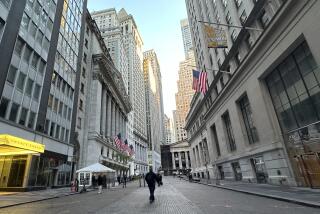Continued Rally Takes Market to New High : Market Overview
The Dow Jones industrial average, bolstered by continued interest in stocks that should benefit from a stronger economy, rose 13.13 points to end at a new record of 3,652.09.
* A late-day rally pushed yields of Treasury securities lower, despite lackluster demand in the government’s auction of new five-year notes.
* The dollar rose against the yen and other currencies after the Bank of Japan caught the market by surprise by intervening on its behalf.
Stocks
Analysts noted that the Dow rallied to another new record despite weakness in two key components: Philip Morris, which fell 2 to 49 1/8 after failing to raise its dividend, disappointing investors, and Coca-Cola, which slid 1 to 43 1/8.
Oil, airline and telephone and communications stocks all provided strength to the rally, as did falling interest rates. But the rally was not quite as strong or broad-based as Tuesday’s, when the 30-share Dow jumped 32.98 points.
Other market gauges also extended record gains Wednesday, but the NASDAQ index gave back some ground.
“There’s the growing perception the economy is getting better,” said Gerald Simmons, head of Interstate/Johnson Lane’s institutional trading.
“The strength in airlines is bullish,” he said. Investors often look to the airlines and other transportation issues as sensitive indicators of the economy’s direction.
Falling bond market interest rates also supported stocks.
Strong performance on overseas markets added to the positive outlook. In Tokyo, the 225-issue Nikkei average rose 0.4% and in London the Financial Times 100-share index rose 1.0%. In Frankfurt, stocks rose 1.1% and in Paris they jumped 1.7%.
Meanwhile, the Toronto market’s key index rose to a new high, finally topping its 1987 peak.
Among U.S. market highlights:
* Telephone and telecommunications equipment stocks rose after a court ruling late Tuesday gave Bell Atlantic permission to provide cable television service. Investors expect new orders from Baby Bells for cable equipment.
Bell Atlantic added 1 5/8 to 61, Nynex rose 7/8 to 89 1/4, Scientific-Atlanta jumped 3 1/8 to 36 3/8, DSC Communications rose 4 3/8 to 65 3/8, Broadband Technology surged 6 to 40 3/4 and General Instrument rose 3 3/8 to 49 1/2.
* Borland International tumbled in reaction to the software company’s plan to halve the price of a popular personal computer spreadsheet program. The action dragged stocks of other makers of spreadsheet software down on fears the lower prices will shrink profits. Borland lost 2 to 18 1/8, Lotus Development fell 1 7/8 to 32 5/8 and Microsoft lost 1 7/8 to 74 1/4.
* Among airlines, Delta added 2 1/4 to 55 1/2 after First Boston raised earnings estimates. UAL rose 2 3/4 to 149 1/8 and AMR jumped 1 3/4 to 67 5/8.
* Mirage Resorts fell 3 1/4 to 50 1/2. The firm lost its bid to build a riverboat casino near Chicago.
* Oil stocks performed well, based on word from the American Petroleum Institute that oil inventories fell sharply last week--an indication oil prices might be heading higher. Atlantic Richfield rose 1 1/4 to 114 7/8.
Other Markets
The Treasury’s benchmark 30-year bond yield, which moves in the opposite direction from price, fell to 6.16%, its lowest level since the Treasury began regularly selling the long bond in 1977. The previous record low yield was 6.19% set Tuesday.
Economists said the market had difficulty digesting the $11 billion in new five-year notes, which were auctioned by the Treasury at a yield of 4.87%.
Many traders were overly optimistic following Tuesday’s extremely successful auction of $16 billion in two-year notes, which drew 3.5 bids for each bid accepted. Wednesday’s auction, in contrast, drew 2.6 bids for each accepted.
Michael Strauss, chief economist at Yamaichi International, also traced some of the market’s initial decline to an early-afternoon news report quoting senior Federal Reserve Board officials as saying inflation would not be tolerated by the central bank.
That raised speculation that the Fed might be more likely to raise short-term interest rates to contain inflation. The dollar gained support not only from the Bank of Japan intervention, but also from a government report of mild German inflation, which boosted chances for a German interest rate cut today.
The dollar rose to 1.6850 marks in New York from 1.6783 marks at Tuesday’s close.
The Bank of Japan bought large amounts of dollars in Tokyo at 104.00 yen when the market had not been expecting action until the dollar fell close to 103.00 yen. U.S. fund managers and corporations jumped on the bandwagon, pushing the dollar to a peak of 105.22 in New York.
Gold prices rose 60 cents on New York’s Commodity Exchange, where bullion for the most active December contract ended at $375.50 an ounce.
Wheat futures prices tumbled on news that the United States will suspend some $500 million worth of exports to China over two years for its alleged sale of sensitive missile technology to Pakistan. The sanctions, mostly on high-technology equipment, sparked worries that China, which denies the missile sales, would retaliate by halting purchases of U.S. grain.
Market Roundup, D8
More to Read
Inside the business of entertainment
The Wide Shot brings you news, analysis and insights on everything from streaming wars to production — and what it all means for the future.
You may occasionally receive promotional content from the Los Angeles Times.










